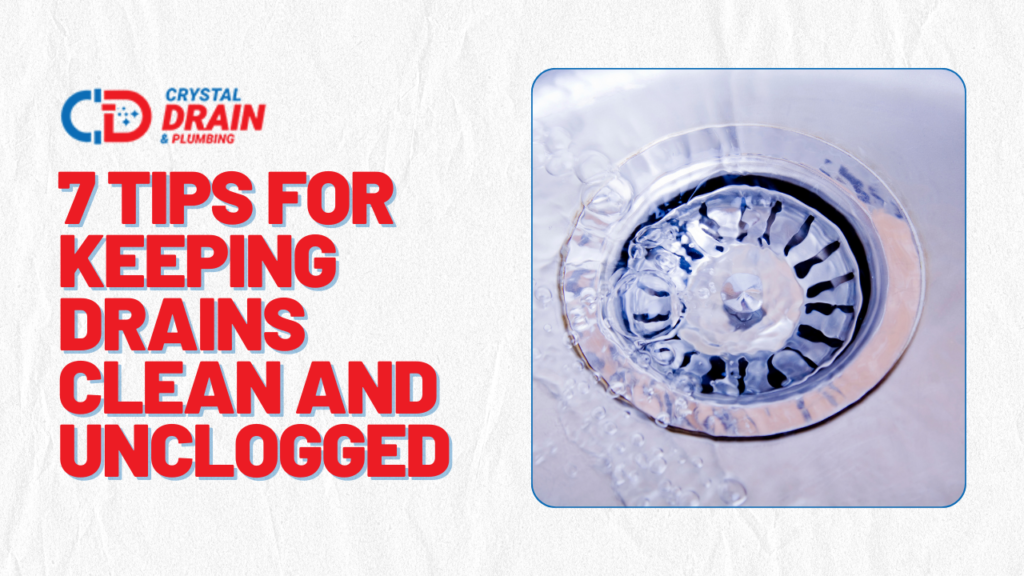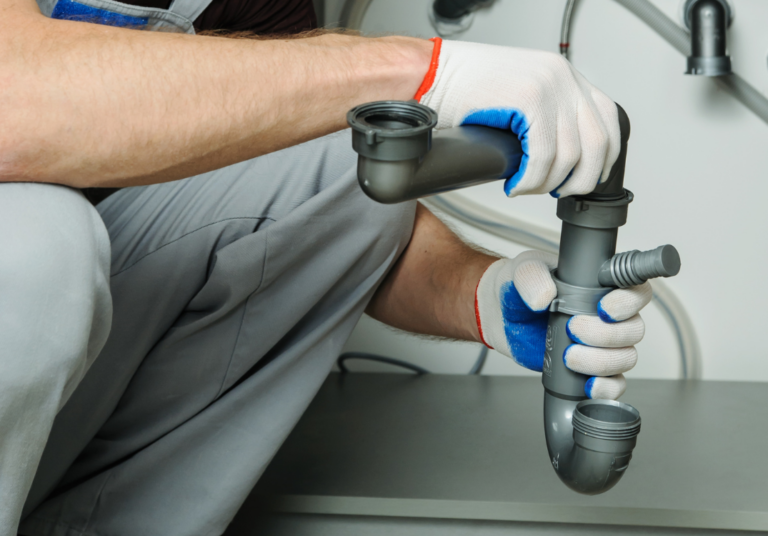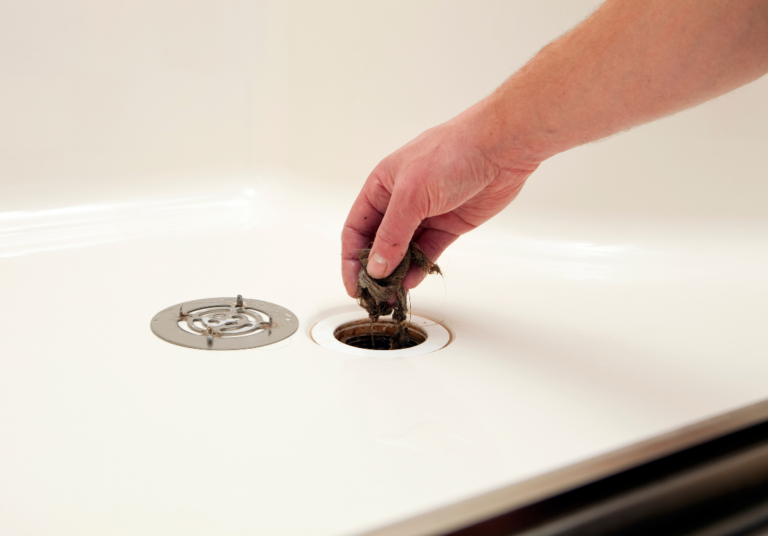7 Tips for Keeping Drains Clean and Unclogged

Clogged drains are one of the most common plumbing problems, but with a little maintenance, you can prevent most issues before they start. Keeping your drains clean is essential not just for convenience, but also to avoid expensive repairs. Here are seven simple but effective tips to help you keep your drains flowing smoothly.
Key Takeaways
- Prevention is Better Than Cure: Regularly clean your drains and dispose of grease properly to prevent clogs before they start.
- Hot Water Is Your Friend: Hot water helps dissolve grease and clear blockages, but don’t overdo it if you have plastic pipes.
- Drain Traps Are Essential: Prevent debris like hair and food scraps from entering your pipes with a simple drain trap or mesh screen.
- Be Careful What You Put Down the Drain: Avoid putting substances like coffee grounds, eggshells, and fruit peels in your drain to prevent clogs.
- Call a Pro When in Doubt: If DIY methods don’t work, don’t hesitate to call a professional plumber to fix stubborn clogs.
1. Use Hot Water to Break Down Grease
Grease is one of the leading causes of clogged kitchen drains, especially after cooking meals with oils, butter, and fats. While you might typically wash your hands with lukewarm or cold water, using hot water for your drains can help dissolve grease and clear any early buildup. Once a week, boil a kettle of water and slowly pour it down your kitchen sink. The hot water breaks down the grease and helps it flow away before it hardens in your pipes.
However, remember that while hot water can help break down grease, cold water can solidify grease and fats, which may aid in easier removal if you have a grease clog in the future. This combination of using both hot and cold water can work wonders!
2. Properly Dispose of Grease
It might be tempting to pour leftover grease from cooking down the drain, but doing so can cause major problems in your plumbing. Grease clings to the inside of pipes, hardening over time and creating blockages. Instead, save the grease in a can or jar and dispose of it properly once it cools. You can also place a piece of foil or wax paper in a disposable container, then discard the solidified grease. This simple habit will prevent slow drains and save you the cost of pipe repairs down the road.
3. Install Drain Traps to Catch Debris
Drains are often clogged by substances like soap scum, hair, food scraps, and even small objects that accidentally fall into sinks and tubs. Installing a drain trap or mesh screen is one of the easiest and most effective ways to prevent this. These devices catch debris before it enters the drain, making it easier to remove them and avoid potential blockages. Simply remove and clean the trap regularly to keep things running smoothly. They’re inexpensive, easy to install, and a great preventive measure for any homeowner.

4. Regularly Clean Your Drains
Regular maintenance can keep your drains clear and fresh. One of the best ways to do this is by using natural ingredients you already have in your home. Pour half a cup of baking soda into the drain, followed by a quarter cup of white vinegar. The chemical reaction between the baking soda and vinegar will fizz, helping to break down any buildup in the pipes. Let it sit for about 15 minutes, then flush the drain with boiling water. For an extra clean, you can also add a tablespoon of dish soap before flushing with hot water. This easy routine helps prevent future clogs and keeps your drains smelling fresh.
5. Avoid Putting Certain Items Down the Drain
Some substances should never be poured down your drains because they can cause serious damage or clogs. Here’s a list of common items to keep out of the sink:
- Eggshells: They can break apart and form sludge in pipes.
- Coffee grounds: These can easily clump together and cause blockages.
- Fruit peels: They can stick to the inside of pipes and trap debris.
- Paper towels or napkins: They don’t break down in water and can easily clog drains.
- Household cleaning products: These can damage your pipes and harm the environment.
- Medications: Flushing pills can lead to environmental harm and plumbing issues.
- Produce stickers: These small adhesives can get stuck in your pipes and cause issues.
If you’re unsure about whether something can go down the drain, it’s always safer to dispose of it in the trash rather than risk clogging your plumbing.

6. Be Mindful of Hair in Bathroom Drains
Hair is one of the biggest culprits behind bathroom clogs, especially in the shower and sink. Over time, hair can gather and form dense clogs in the pipes. To prevent this, install a hair catcher or mesh screen in your shower and sink drains. These devices catch hair before it enters the pipes and can be easily cleaned out when full. If you don’t have a hair catcher, make it a habit to remove any hair from the drain after each shower to minimize buildup. Regular maintenance here can save you a lot of hassle down the line.
7. Call a Professional for Persistent Clogs
While these DIY methods work well for most clogs, sometimes you may face a persistent or deep-rooted blockage that requires professional attention. If you’ve tried everything and your drains still won’t clear, it’s time to call a professional plumber. Using harsh chemicals or forceful methods on your own can damage your pipes, leading to even more costly repairs. Plumbers at Crystal Drain are equipped with specialized tools and techniques to safely and efficiently clear even the toughest blockages. If you’re dealing with a stubborn clog, don’t hesitate to contact the experts for a fast, reliable solution.
FAQs
It’s a good idea to clean your drains at least once a month to avoid buildup. For kitchens and bathrooms with heavy use, you might want to clean them every two weeks.
If your drain is slowing down, try using a mixture of baking soda and vinegar, followed by boiling water. For tougher clogs, a professional drain cleaning might be necessary.
Boiling water can be safe for most pipes, especially metal ones. However, if your plumbing is old or made of plastic, it’s best to use warm water to avoid cracking or damaging the pipes.
Foul odors usually indicate organic matter buildup in your pipes. Clean your drain with baking soda and vinegar, or use an enzymatic cleaner designed for organic waste. Regular cleaning can also prevent odors from returning.
Chemical drain cleaners can be effective, but they often contain harsh chemicals that can damage pipes over time. It’s safer to use natural alternatives or call a plumber if the clog is severe.
